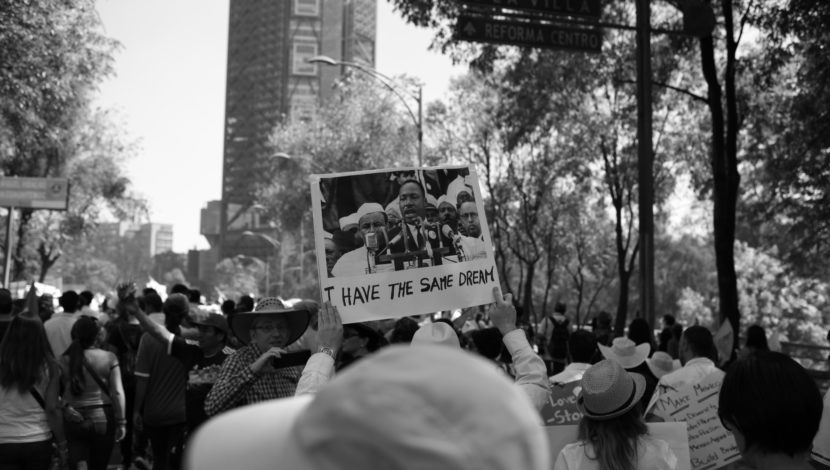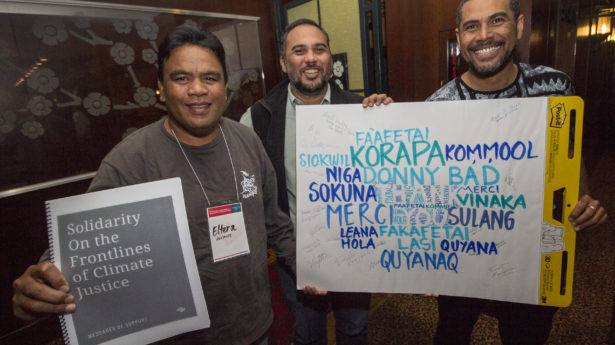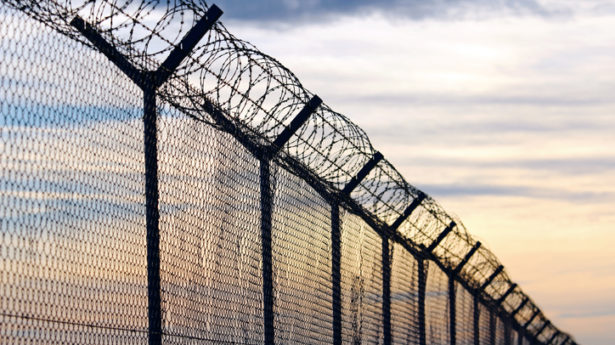The Unitarian Universalist Service Committee advances human rights through grassroots collaborations.
On MLK Day, We Celebrate Solidarity with Communities of Color

By on January 18, 2019
January 15, 2019 marked the 90th anniversary of Dr. King’s birth. As we celebrate and work to uphold his legacy, we honor the many Black and Brown leaders today who are fighting to defend human rights, resist incarceration, and halt deportation and family separation in our communities.
This past week, UUSC’s partners the UndocuBlack Network led the nation’s first Freedom of Information Act challenge to Trump’s attempt to force deportations to four African and Asian countries, by using harsh visa sanctions. These coercive sanctions are merely one piece of a broader racist agenda targeting immigrants of color, and UndocuBlack’s lawsuit builds on similar challenges they’ve made to the administration’s racially-motivated bid to end Temporary Protected Status for Haitian nationals.
In another recent update from our partners, Grassroots Leadership shared their work to lead a march and rally to demand the release of an asylum-seeking mother from El Salvador, Melvin Griselda Cruz-Lopez, who has twice been separated from her six-year-old daughter – first by deportation and second by detention. As Grassroots Leadership organizer Sofia Casini points out, there is nothing to prevent the administration from using their lawful parole powers to release Griselda at any time.
The real barrier at this point in the process is a cruel and racist immigration agenda that places incarceration and removal ahead of human rights.
Policies of exclusion and white supremacy are precisely the evils Dr. King confronted. As he noted, these injustices cannot be understood apart from what he called “The triple evils of racism, economic exploitation, and militarism.” For Dr. King, this intersectional understanding led him to speak out not only against segregation, but against poverty, economic inequality, and aggressive U.S. wars abroad. As he wrote in a 1967 speech:
[M]any persons have questioned me […] “Why are you speaking about the [Vietnam] war, Dr. King?” “Why are you joining the voices of dissent?” […] And when I hear them, though I often understand the source of their concern, I am nevertheless greatly saddened, for such questions mean that the inquirers have not really known me. Indeed, their questions suggest that they do not know the world in which they live.
So too, the struggle against Trump’s hateful policies requires a deeper understanding of the world in which we live, and the role that U.S. militarism and imperialism have played within it.
Trump’s focus on detaining and deporting asylum-seekers affects thousands of Central Americans, who have fled a region deeply harmed and destabilized by U.S. policies over the last few decades –including U.S. support for dictatorships and paramilitary death squads in the 1980s and for the post-coup government of Honduras since 2009.
So too, the coercive visa sanctions that UndocuBlack challenged this week are directed in part against refugees from Laos and Cambodia. Last year, the Trump administration similarly moved to undo a U.S. treaty with Vietnam that shields thousands of Vietnamese immigrants from deportation, leaving the future of those protections in doubt.
These policies target a generation of people displaced by the same U.S. wars in Southeast Asia that Dr. King strove to end. For these reasons, many civil rights groups are planning to begin a National Week of Action to End Southeast Asian Deportations on January 19 that will coincide with MLK Day.
As UUSC continues to join with our partners in the United States and abroad in the struggle for human rights, we remember that these “triple evils” of injustice are deeply connected. For this reason, our only means to defeat them is through an equally interdependent network of solidarity.
Photo Credit: Unsplash – Jerónimo Bernot

